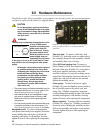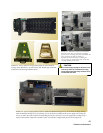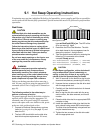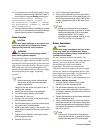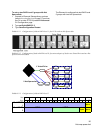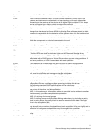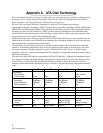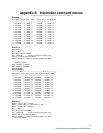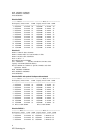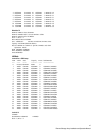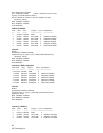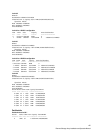
ii
Diamond Storage Array Installation and Operation Manual
F_port A port in the Fibre Channel fabric where a N_port may attach
FC-AL Fibre Channel Arbitrated Loop: a Fibre Channel network in which up to 126
systems and devices are connected in a loop topology, with each transmitter
connecting to the receiver of the device to its logical right; multiple FC-AL loops
can be connected via a fabric switch to extend the network
FL-port A port in the Fibre Channel fabric where a NL_port may attach in an arbitrated loop
firmware Software stored in read-only memory (ROM) or programmable ROM; easier to
change than hardware but more difficult to change than software stored on disk;
firmware is responsible for the behavior of the system when it is first switched on
host a processor which communicates with devices over an interface
hot swapping Components are removed and replaced while the unit is running, with power to
either the component or a device connected to the unit
initiator device A component which originates a command
JBOD Just a Bunch of Disks: a storage subsystem of multiple independent disk drives
L_port a port in an arbitrated loop, either a NL_port or a FL_port
LED Light-emitting diode, a type of diode that emits light when current passes through
it; visible LEDs are used as indicator lights on the Diamond Storage Array
LUN Logical Unit Number: a SCSI or Fibre Channel identifier of a device. A LUN is
associated with a RAID group or Virtual Drive unless you are using partitions. If
you have partitions, a LUN is associated with each partition.
N_port a port attached to a node used with point to point or fabric configurations
NL_ port a port attached to a node in Fibre Channel arbitrated loop or fabric loop
originator an initiating device; a component which originates a command
partition a continuous range of addresses in a storage subsystem that appear as a logical
unit; used to subdivide and manage a storage subsystem
port an access point in a device: see N_port, NL_port, etc.
receiver the ultimate destination of data transmission; a terminal device
RAID originally Redundant Array of Inexpensive Disks, now Redundant Array of
Independent Drives: a storage system spanning multiple disk drives.
The following standard RAID specifications will be used here:
RAID 0: non-redundant striped array; drives are accessed alternately, as if stacked
one on top of the other; no data protection
RAID 1: mirrored arrays: information written to one disk is also written to another
simultaneously; provides complete data protection
RAID 10: striping of mirrored groups
RAID 5: striping across multiple disks offering redundancy by including a parity
block in every stripe; the parity block is used to reconstruct the data if a single
drive in the subsystem fails
subpartition a convenient term used to describe the allocation nature of a partition; a partition
may be split into a number of subpartitions (each a partition in its own right) and a
collection of contiguous subpartitions may be merged into a partition
Virtual Drive
the presentation of a collection of disk drives as a single logical disk, also known as a RAID
group.
Virtual Drive ID a unique identifier associated with each Virtual Drive and displayed via CLI
Term Definition




